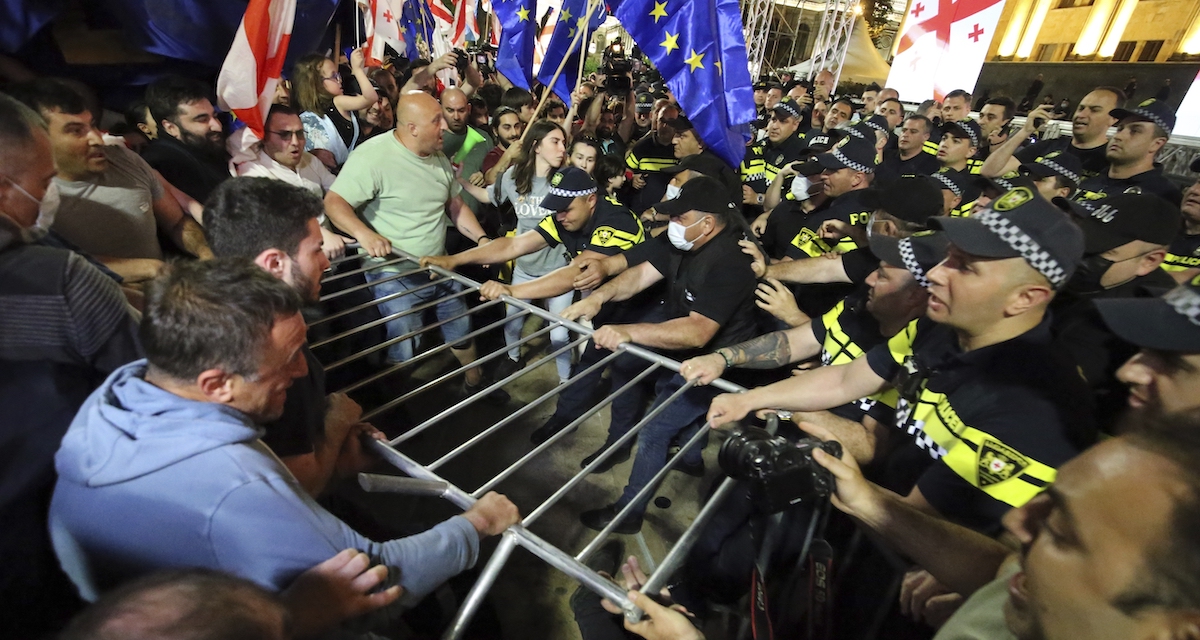Since mid-April in Georgia (the country in the Caucasus, not the American state) thousands of people have been demonstrating against a bill that would classify as “foreign agents” all associations that receive at least 20 percent of their funds from ‘abroad. The proposal, promoted by the government led by the populist Georgian Dream party, is modeled on a similar law in force for years in Russia, which Vladimir Putin’s regime has used to shut down independent media, NGOs and civil society associations.
It is not the first time that Georgia has demonstrated against this bill: the Georgian Dream government had already tried to pass it just over a year ago, but withdrew it after large popular protests. Now the government is trying again: the protests have returned, but there are various signs that seem to indicate that the government’s strategy has changed, and that the repression, this time, could be harsher.
The law on “foreign agents” is opposed by the majority of Georgian citizens mainly for two reasons: first of all because Georgians see it as a danger to democracy, already put in crisis by various measures adopted by the populist Georgian Dream government. Critics call it a “Russian law”, and argue that it would give the government the power to shut down opposition media and threaten NGOs and civil society associations.
A Georgian protester with the European Union flag (AP Photo/Zurab Tsertsvadze)
Secondly, because the law would be a serious impediment to Georgia’s attempts to access the European Union, which for the population is one of the main priorities: according to polls, almost 80 percent of Georgians wants to join the Unionboth to improve its economy and to protect itself from Russia, which invaded the country in 2008 and still militarily occupies the two Georgian regions of Abkhazia and South Ossetia.
– Listen to Globo: Georgia, which was first
Faced with such openly aligned public opinion, the Georgian Dream government has always tried to maintain a certain balance, at least in public. The party and its ruling class are clearly very close and favorable to Vladimir Putin’s Russia: its founder, the billionaire Bidzina Ivanishvili, has most of his financial interests in Russia, and has always been aligned with the positions of the Russian regime. Ivanishvili, who was prime minister between 2012 and 2013, is the richest man in Georgia and although he claims to have left politics, he continues to manipulate the party and the country’s government from the outside, and to have an enormous influence on its economy.
Despite this, for years Sogno Georgiano has tried to navigate between its pro-Russian tendencies and a firmly pro-European public opinion: among other things, Georgia has formally requested to join the European Union in 2022, and at the end of the year last obtained the status of candidate country.
After the recent clashes around the “foreign agents” law, however, the situation seems to have changed, and the government seems ready to adopt a more openly hostile position towards the West.
Demonstrations against the law on “foreign agents” in Tbilisi (AP Photo/Zurab Tsertsvadze)
Many analysts noticed this after this week, following days of large anti-government protests, Ivanishvili had attacked in a very harsh and unprecedented manner by the West, supporting conspiracy theories according to which the protests against the government are being manipulated by a “global war party” managed by the West which wants to destabilize the government of Georgia, and therefore the whole country.
According to Ivanishvili, the West is funding NGOs in Georgia (those that “Russian law” would like to sanction) to foment a revolution that would bring instability and which would turn the country against Russia, and therefore against its interests.
This type of rhetoric is all in all new for Ivanishvili and the Georgian Dream, but it is very common in other states: it is very similar to the rhetoric used by Vladimir Putin against his internal opponents, systematically accused of being manipulated by the West to damage Russia ; and it is similar to the rhetoric used by Belarusian dictator Alexander Lukashenko when he violently repressed popular protests against him.
Bidzina Ivanishvili (AP Photo/Shakh Aivazov)
The idea is that, faced with a second large wave of demonstrations against the “Russian law”, Ivanishvili and Georgian Dream have decided to put an end to the balance they had tried to maintain until now, to take a more open stand against the West and to attack the protests, delegitimizing them. Ivanishvili’s words «are a clear anti-Western manifesto, which certifies the complete reorientation of the country’s foreign policy since Georgian Dream came to power 12 years ago: away from Europe and closer to Russia, but also to China, which it is seen as an alternative to the West”, he said a The Monde Davit Zedelashvili, a political scientist and researcher at the Gnomon Wise study center in Tbilisi, the capital.
This operation to delegitimize the opposition could mean that the government will intensify its repression activity, both politically and with regards to demonstrations. In the days following Ivanishvili’s statements, police violence against demonstrators actually became more intense: police dispersed demonstrators with tear gas, water cannons and pepper spray, and dozens of people were beaten and arrested. Among the people who suffered violence was also the leader of the main opposition party, United National Movement, who the following day appeared in parliament with his face bandaged. Obviously, however, it is not possible to establish a direct correlation between Ivanishvili’s statements and the behavior of the police.
The “Russian law” has already been approved at second reading by parliament, which is controlled by Georgian Dream. If the government intends to move forward, it will most likely also be approved at third reading. President Salome Zourabichvili, who is not affiliated with Georgian Dream, has said she will veto the law, but the government has enough votes in parliament to override the veto.
